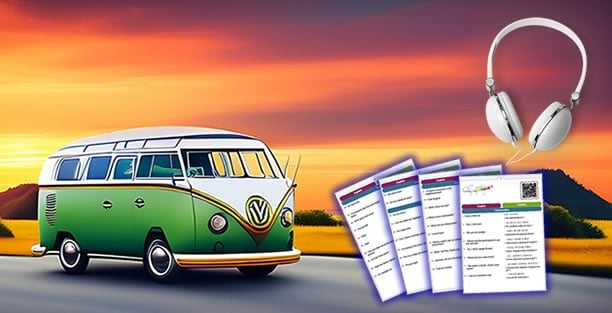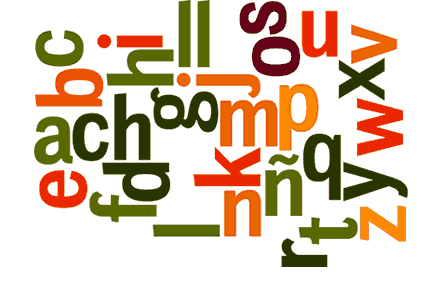Learn Spanish
| English | Spanish | |||
|---|---|---|---|---|
| Hello | ¡Hola! | |||
| Hello | ¡Buenos días! | |||
| Good evening | Buenas tardes | |||
| Goodbye | Adiós | |||
| See you later | Hasta Luego | |||
| Yes | Sí | |||
| No | No | |||
| Excuse me! | ¡Disculpe! | |||
| Thanks | Gracias | |||
| Thanks a lot | ¡Muchas gracias! | |||
| Thank you for your help | Gracias por su ayuda | |||
| You’re welcome | De nada | |||
| Okay | De acuerdo | |||
| How much is it? | ¿Cuánto cuesta? | |||
| Sorry! | ¡Discúlpeme! | |||
| I don't understand | No entiendo | |||
| I get it | Entendí | |||
| I don't know | No sé | |||
| Forbidden | Prohibido | |||
| Excuse me, where are the toilets? | ¿Dónde están los baños? | |||
| Happy New Year! | ¡Feliz año nuevo! | |||
| Happy Birthday! | ¡Feliz cumpleaños! | |||
| Happy Holidays! | ¡Felices fiestas! | |||
| Congratulations! | ¡Felicidades! |
Objectives Do you want to learn the basics of Spanish to manage the most common everyday situations, in Spain or Latin America? Loecsen is a structured Spanish course for beginners, aligned with the skills expected at the A1 level of the CEFR. The vocabulary and sentences are selected to match real-life situations, while following a clear pedagogical progression. Here, there is no complicated method or content disconnected from real life: you focus on what matters most, with complete sentences, grammar explained through usage, and modern tools to help you memorize and pronounce correctly. Result: in just a few weeks, with only 15 minutes a day, you reach your first A1 language goal and gain practical autonomy from the very first interactions.
Spanish: where is it spoken and which variant should you learn first?
Spanish is spoken in Spain and in most countries of Latin America. It is one of the most widely used languages in the world, both in everyday life and in professional and cultural contexts. Despite differences in pronunciation and vocabulary depending on the region, Spanish remains largely mutually intelligible in common situations.
In this course, the Spanish taught is standard Spanish from Spain. This variant provides a clear, structured foundation that is understood throughout the Spanish-speaking world. It allows learners to communicate effectively everywhere and to adapt easily to local usage later on.
How does Spanish work? A logical and accessible language
Spanish most often follows a subject – verb – object structure. For example: “Yo vivo aquí” or “Ella trabaja mañana”. This stable structure makes it possible to build correct sentences very early, even for complete beginners.
Spanish pronunciation is largely regular. Most letters are pronounced consistently, which helps learners read, understand, and pronounce simple sentences quickly, such as “Hola, ¿cómo estás?”.
Spanish grammar explained with clear examples
In Spanish, nouns have a gender (masculine or feminine), and adjectives agree with them in gender and number. For example: “una casa grande”, “dos casas grandes”. These agreements are visible, systematic, and easy to recognize.
Adjectives are generally placed after the noun. For example: “un coche nuevo”, “una ciudad bonita”. This pattern is very common in everyday Spanish and easy to apply in most situations.
Verbs are central to communication. From the beginning, it is useful to learn the most frequent present-tense forms such as “soy”, “tengo”, “vivo”, and “quiero”. With these verbs, learners can already express many basic ideas.
What to learn first to speak Spanish
To learn Spanish effectively, it is better to start with complete and useful sentences rather than isolated words. For example: “Vivo aquí”, “Quiero agua”, “No entiendo”, “¿Dónde está el baño?”. These sentences can be used immediately in real-life situations.
Learning through full sentences helps learners understand grammar naturally, memorize vocabulary in context, and start speaking without waiting to master all theoretical rules.
A concrete and effective to-do list for learning Spanish with Loecsen
Learning Spanish in a sustainable way does not require long study sessions, but simple, regular, and well-targeted actions. The Loecsen method focuses on creating multiple memory connections around the same sentences: listening, speaking, writing, and reusing.
- Practice every day, even for just 5 minutes. Regularity matters more than duration. Five minutes is enough to maintain progress, even on low-motivation days.
- Learn complete and useful sentences, such as “Quiero aprender español” or “No entiendo”. A sentence activates meaning, grammar, and pronunciation at the same time.
- Speak out loud as often as possible. Repeating sentences aloud anchors sounds and rhythm much more effectively than silent reading.
- Work on pronunciation through focused repetition, imitating exactly the sentences provided in the course.
- Write simple sentences by hand on a notebook or sticky notes. Handwriting strongly reinforces memory.
- Create visual reminders in your daily environment to associate the language with concrete actions.
- Review the same sentences regularly until they become automatic.
- Use the “Listening” mode to immerse yourself in Spanish sounds, even without active speaking.
- Use the “Dialogue with an AI” mode to reuse vocabulary more freely and build real autonomy.
- Use the “Learn with Music” page to study Spanish through songs, films, series, or personal content you enjoy.
This approach multiplies cognitive and emotional connections, allowing learners to progress faster while building a strong and lasting foundation in Spanish.
Anti-dropout tips when motivation decreases
A drop in motivation is normal in language learning. It does not mean failure, but simply that the brain needs variety.
- Reduce the goal voluntarily to 2 or 5 minutes to make starting easier.
- Change the mode: listen instead of speaking, or reread a familiar sentence.
- Return to already mastered sentences to quickly restore confidence.
- Use music or content you enjoy through the “Learn with Music” page.
- Speak without aiming for perfection. Using the language is always better than staying silent.
- Change the time of day when you practice.
- Remember the real goal: understanding and being understood in simple situations.
- Use AI dialogue as a game, without pressure or performance expectations.
In language learning, consistency always matters more than intensity.
How the Loecsen “Premier Contact” Spanish course helps in practice
The Loecsen “Premier Contact” Spanish course is a free online Spanish course designed for complete beginners. It focuses on essential everyday sentences and their immediate reuse.
Each sentence is practiced through listening and repetition, with special attention to pronunciation. Grammar is introduced only through usage, when it becomes useful.
With 5 to 15 minutes of practice per day, learners can quickly reach a first functional A1 level and start understanding and speaking Spanish in simple situations.
Frequently asked questions about learning Spanish
Is Spanish difficult to learn?
Spanish is considered an accessible language thanks to its regular pronunciation and clear structure.
Do I need to learn grammar before speaking?
No. Starting with complete sentences is more effective. Grammar is absorbed naturally through usage.
Is Spanish from Spain understood in Latin America?
Yes. Differences exist, but they never prevent communication in everyday situations.
How long does it take to understand simple sentences?
With regular practice, learners can understand and use basic sentences within a few weeks.
Can you learn Spanish on your own for free?
Yes, as long as you follow a structured course focused on real-life usage, such as the Loecsen “Premier Contact” course.
Course syllabus – What you’ll learn
- Essentials 3-5H • 64-96D • 25-38 sessions
- Conversation 3-5H • 64-96D • 25-38 sessions
- Learning 1-2H • 61-92D • 10-15 sessions
- Colours 1-2H • 61-92D • 10-15 sessions
View all lessons (17)
- Numbers 4-6H • 67-101D • 40-60 sessions
- Time tracking 3-5H • 64-96D • 25-38 sessions
- Taxi 2-3H • 62-93D • 15-23 sessions
- Family 2-3H • 62-93D • 15-23 sessions
- Feelings 2-3H • 63-95D • 20-30 sessions
- Bar 3-5H • 64-96D • 25-38 sessions
- Restaurant 3-5H • 65-98D • 30-45 sessions
- Parting 2-3H • 62-93D • 15-23 sessions
- Transportation 0-0H • 59-89D • 0-0 sessions
- Hotel 3-5H • 65-98D • 30-45 sessions
- Looking for someone 1-2H • 61-92D • 10-15 sessions
- Beach 3-5H • 65-98D • 30-45 sessions
- In case of trouble 2-3H • 63-95D • 20-30 sessions
Objectives The Fluent in 6 Months – Spanish course is designed for learners who want to go beyond the basics and understand everyday Spanish while expressing themselves with greater ease. This structured course leads to a solid A2 level, with key elements of B1, by focusing on the most commonly used words and expressions, covering around 80 % of real-life communication. Grammar is integrated naturally into each lesson through concrete, real-life situations. The goal is to communicate effectively in Spanish and gain real autonomy in less than one year.
Spanish: where is it spoken and which variant should you learn first?
Spanish is spoken in Spain and in most countries of Latin America. It is one of the most widely used languages in the world, both in everyday life and in professional and cultural contexts. Despite differences in pronunciation and vocabulary depending on the region, Spanish remains largely mutually intelligible in common situations.
In this course, the Spanish taught is standard Spanish from Spain. This variant provides a clear, structured foundation that is understood throughout the Spanish-speaking world. It allows learners to communicate effectively everywhere and to adapt easily to local usage later on.
How does Spanish work? A logical and accessible language
Spanish most often follows a subject – verb – object structure. For example: “Yo vivo aquí” or “Ella trabaja mañana”. This stable structure makes it possible to build correct sentences very early, even for complete beginners.
Spanish pronunciation is largely regular. Most letters are pronounced consistently, which helps learners read, understand, and pronounce simple sentences quickly, such as “Hola, ¿cómo estás?”.
Spanish grammar explained with clear examples
In Spanish, nouns have a gender (masculine or feminine), and adjectives agree with them in gender and number. For example: “una casa grande”, “dos casas grandes”. These agreements are visible, systematic, and easy to recognize.
Adjectives are generally placed after the noun. For example: “un coche nuevo”, “una ciudad bonita”. This pattern is very common in everyday Spanish and easy to apply in most situations.
Verbs are central to communication. From the beginning, it is useful to learn the most frequent present-tense forms such as “soy”, “tengo”, “vivo”, and “quiero”. With these verbs, learners can already express many basic ideas.
What to learn first to speak Spanish
To learn Spanish effectively, it is better to start with complete and useful sentences rather than isolated words. For example: “Vivo aquí”, “Quiero agua”, “No entiendo”, “¿Dónde está el baño?”. These sentences can be used immediately in real-life situations.
Learning through full sentences helps learners understand grammar naturally, memorize vocabulary in context, and start speaking without waiting to master all theoretical rules.
A concrete and effective to-do list for learning Spanish with Loecsen
Learning Spanish in a sustainable way does not require long study sessions, but simple, regular, and well-targeted actions. The Loecsen method focuses on creating multiple memory connections around the same sentences: listening, speaking, writing, and reusing.
- Practice every day, even for just 5 minutes. Regularity matters more than duration. Five minutes is enough to maintain progress, even on low-motivation days.
- Learn complete and useful sentences, such as “Quiero aprender español” or “No entiendo”. A sentence activates meaning, grammar, and pronunciation at the same time.
- Speak out loud as often as possible. Repeating sentences aloud anchors sounds and rhythm much more effectively than silent reading.
- Work on pronunciation through focused repetition, imitating exactly the sentences provided in the course.
- Write simple sentences by hand on a notebook or sticky notes. Handwriting strongly reinforces memory.
- Create visual reminders in your daily environment to associate the language with concrete actions.
- Review the same sentences regularly until they become automatic.
- Use the “Listening” mode to immerse yourself in Spanish sounds, even without active speaking.
- Use the “Dialogue with an AI” mode to reuse vocabulary more freely and build real autonomy.
- Use the “Learn with Music” page to study Spanish through songs, films, series, or personal content you enjoy.
This approach multiplies cognitive and emotional connections, allowing learners to progress faster while building a strong and lasting foundation in Spanish.
Anti-dropout tips when motivation decreases
A drop in motivation is normal in language learning. It does not mean failure, but simply that the brain needs variety.
- Reduce the goal voluntarily to 2 or 5 minutes to make starting easier.
- Change the mode: listen instead of speaking, or reread a familiar sentence.
- Return to already mastered sentences to quickly restore confidence.
- Use music or content you enjoy through the “Learn with Music” page.
- Speak without aiming for perfection. Using the language is always better than staying silent.
- Change the time of day when you practice.
- Remember the real goal: understanding and being understood in simple situations.
- Use AI dialogue as a game, without pressure or performance expectations.
In language learning, consistency always matters more than intensity.
How the Loecsen “Premier Contact” Spanish course helps in practice
The Loecsen “Premier Contact” Spanish course is a free online Spanish course designed for complete beginners. It focuses on essential everyday sentences and their immediate reuse.
Each sentence is practiced through listening and repetition, with special attention to pronunciation. Grammar is introduced only through usage, when it becomes useful.
With 5 to 15 minutes of practice per day, learners can quickly reach a first functional A1 level and start understanding and speaking Spanish in simple situations.
Frequently asked questions about learning Spanish
Is Spanish difficult to learn?
Spanish is considered an accessible language thanks to its regular pronunciation and clear structure.
Do I need to learn grammar before speaking?
No. Starting with complete sentences is more effective. Grammar is absorbed naturally through usage.
Is Spanish from Spain understood in Latin America?
Yes. Differences exist, but they never prevent communication in everyday situations.
How long does it take to understand simple sentences?
With regular practice, learners can understand and use basic sentences within a few weeks.
Can you learn Spanish on your own for free?
Yes, as long as you follow a structured course focused on real-life usage, such as the Loecsen “Premier Contact” course.
Course syllabus – What you’ll learn
- Essentials 3-5H • 64-96D • 25-38 sessions
- Conversation 3-5H • 64-96D • 25-38 sessions
- Learning 1-2H • 61-92D • 10-15 sessions
- Colours 1-2H • 61-92D • 10-15 sessions
View all lessons (17)
- Numbers 4-6H • 67-101D • 40-60 sessions
- Time tracking 3-5H • 64-96D • 25-38 sessions
- Taxi 2-3H • 62-93D • 15-23 sessions
- Family 2-3H • 62-93D • 15-23 sessions
- Feelings 2-3H • 63-95D • 20-30 sessions
- Bar 3-5H • 64-96D • 25-38 sessions
- Restaurant 3-5H • 65-98D • 30-45 sessions
- Parting 2-3H • 62-93D • 15-23 sessions
- Transportation 0-0H • 59-89D • 0-0 sessions
- Hotel 3-5H • 65-98D • 30-45 sessions
- Looking for someone 1-2H • 61-92D • 10-15 sessions
- Beach 3-5H • 65-98D • 30-45 sessions
- In case of trouble 2-3H • 63-95D • 20-30 sessions






